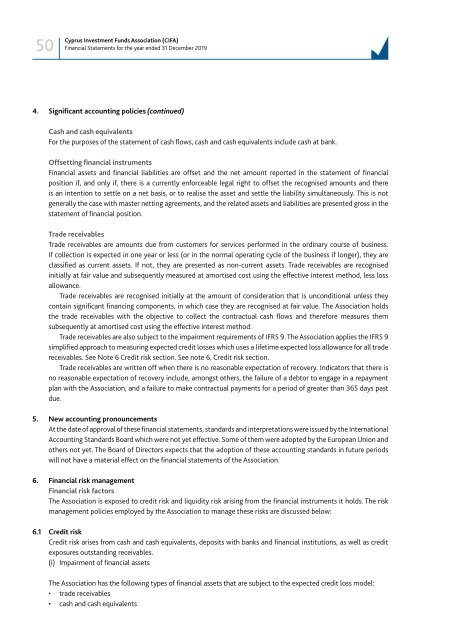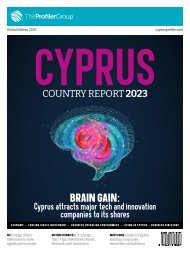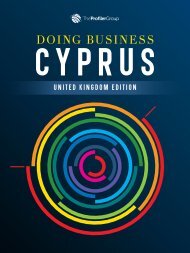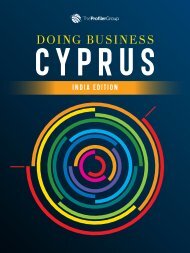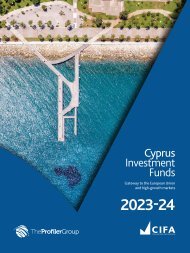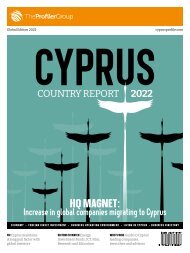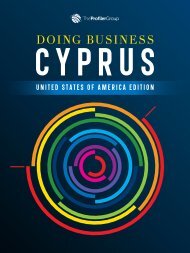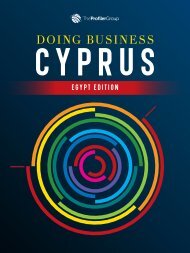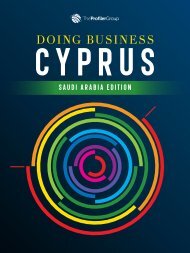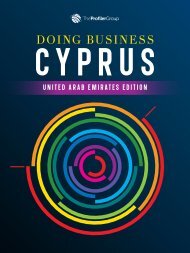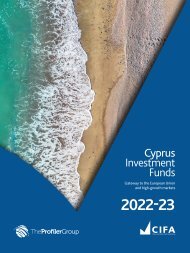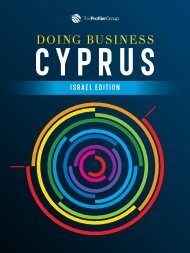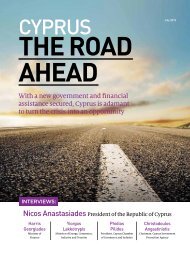CIFA Annual Review 2020
Cyprus Investment Funds Association Annual Review 2020
Cyprus Investment Funds Association Annual Review 2020
Create successful ePaper yourself
Turn your PDF publications into a flip-book with our unique Google optimized e-Paper software.
50<br />
Cyprus Investment Funds Association (<strong>CIFA</strong>)<br />
Financial Statements for the year ended 31 December 2019<br />
4. Significant accounting policies (continued)<br />
Cash and cash equivalents<br />
For the purposes of the statement of cash flows, cash and cash equivalents include cash at bank.<br />
Offsetting financial instruments<br />
Financial assets and financial liabilities are offset and the net amount reported in the statement of financial<br />
position if, and only if, there is a currently enforceable legal right to offset the recognised amounts and there<br />
is an intention to settle on a net basis, or to realise the asset and settle the liability simultaneously. This is not<br />
generally the case with master netting agreements, and the related assets and liabilities are presented gross in the<br />
statement of financial position.<br />
Trade receivables<br />
Trade receivables are amounts due from customers for services performed in the ordinary course of business.<br />
If collection is expected in one year or less (or in the normal operating cycle of the business if longer), they are<br />
classified as current assets. If not, they are presented as non-current assets. Trade receivables are recognised<br />
initially at fair value and subsequently measured at amortised cost using the effective interest method, less loss<br />
allowance.<br />
Trade receivables are recognised initially at the amount of consideration that is unconditional unless they<br />
contain significant financing components, in which case they are recognised at fair value. The Association holds<br />
the trade receivables with the objective to collect the contractual cash flows and therefore measures them<br />
subsequently at amortised cost using the effective interest method.<br />
Trade receivables are also subject to the impairment requirements of IFRS 9. The Association applies the IFRS 9<br />
simplified approach to measuring expected credit losses which uses a lifetime expected loss allowance for all trade<br />
receivables. See Note 6 Credit risk section. See note 6, Credit risk section.<br />
Trade receivables are written off when there is no reasonable expectation of recovery. Indicators that there is<br />
no reasonable expectation of recovery include, amongst others, the failure of a debtor to engage in a repayment<br />
plan with the Association, and a failure to make contractual payments for a period of greater than 365 days past<br />
due.<br />
5. New accounting pronouncements<br />
At the date of approval of these financial statements, standards and interpretations were issued by the International<br />
Accounting Standards Board which were not yet effective. Some of them were adopted by the European Union and<br />
others not yet. The Board of Directors expects that the adoption of these accounting standards in future periods<br />
will not have a material effect on the financial statements of the Association.<br />
6. Financial risk management<br />
Financial risk factors<br />
The Association is exposed to credit risk and liquidity risk arising from the financial instruments it holds. The risk<br />
management policies employed by the Association to manage these risks are discussed below:<br />
6.1 Credit risk<br />
Credit risk arises from cash and cash equivalents, deposits with banks and financial institutions, as well as credit<br />
exposures outstanding receivables.<br />
(i) Impairment of financial assets<br />
The Association has the following types of financial assets that are subject to the expected credit loss model:<br />
• trade receivables<br />
• cash and cash equivalents


